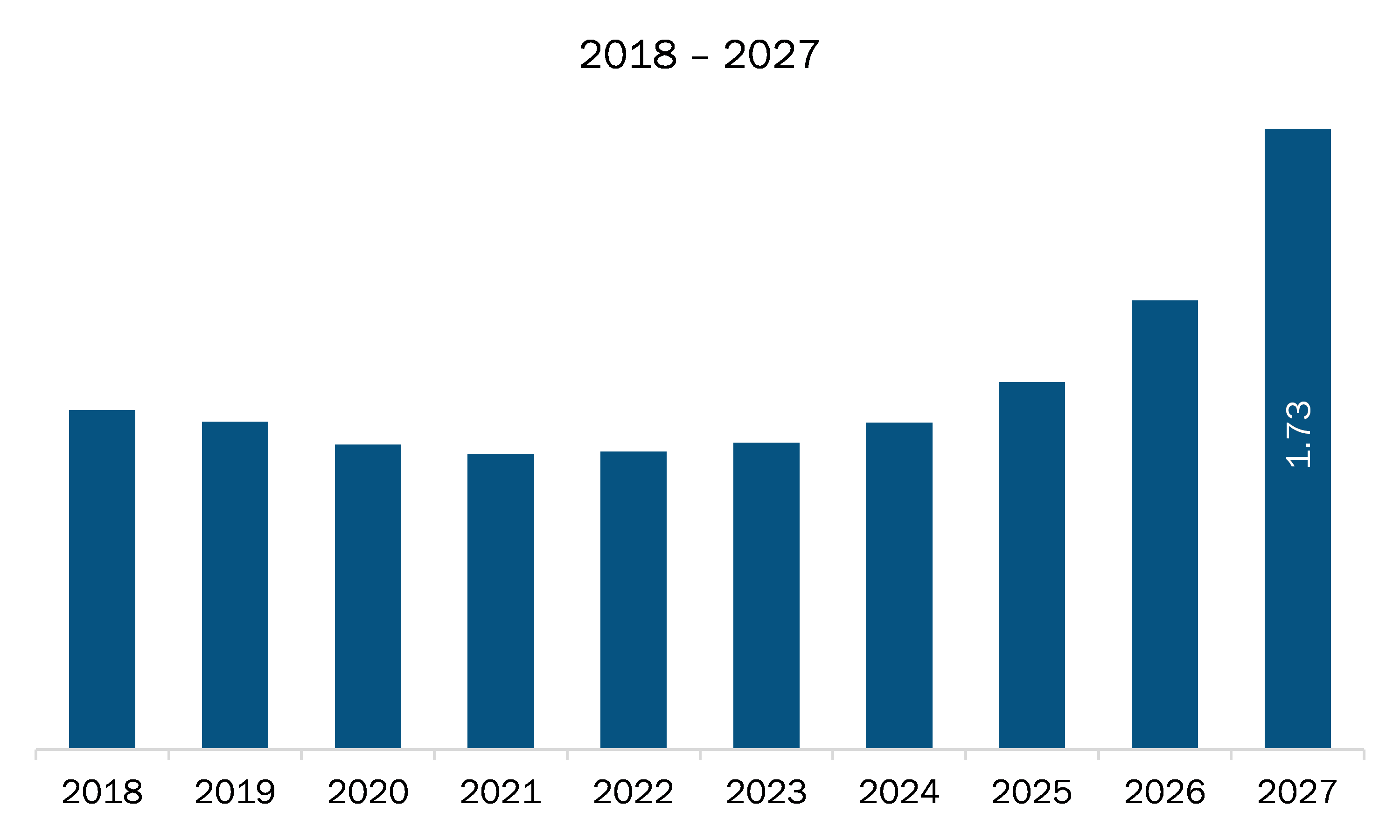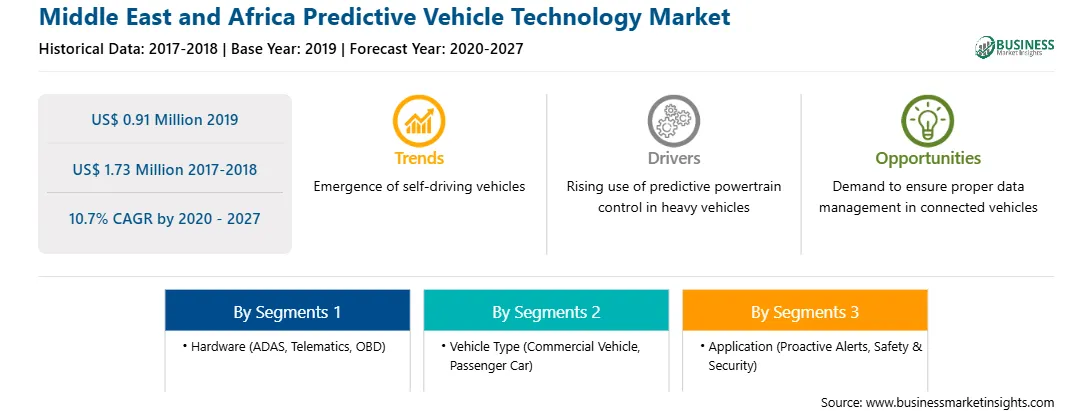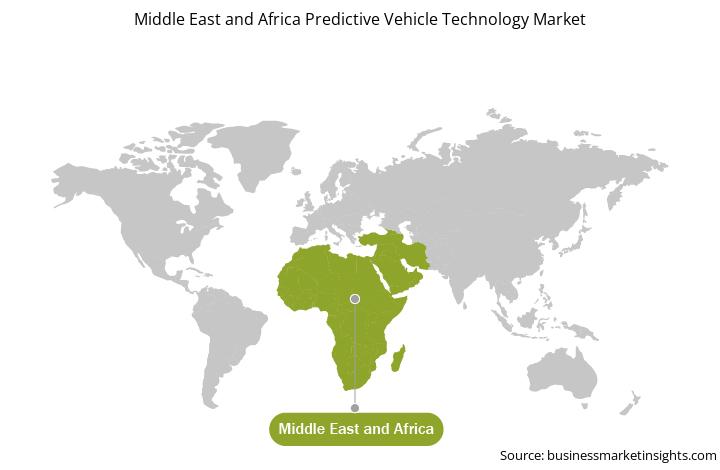Middle East and Africa Predictive Vehicle Technology Market
No. of Pages: 91 | Report Code: TIPRE00014125 | Category: Automotive and Transportation
No. of Pages: 91 | Report Code: TIPRE00014125 | Category: Automotive and Transportation
At present, the automotive industry is experiencing significant incorporation of various advanced technologies in cars to improve the occupants' safety and efficiency. The automakers are leveraging artificial intelligence (AI) and machine learning (ML) to realize the driver's patterns and trends and improve the safety of the vehicle. Both technologies are ready to become a vital part of upcoming vehicles and the automotive industry. In the race of connected cars and self-driving vehicles, predictive vehicle technologies are gaining acceptance among all auto types, which offers amazing convenience to the driver and passengers. Therefore, the automakers are concentrating on adopting connected gadgets and IoT (internet of things) in vehicles that support voice commands. The integration of IoT in connected cars is the next big digital development that persists in the automotive industry. This fact will result in bringing another revolution via the introduction of autonomous vehicles. The self-driving cars/autonomous vehicles include a sensor management system that makes IoT vehicle-to-vehicle communication possible and a reality. The quick development of connected cars offers opportunities to both the automotive industry and tech companies. The factor described above of connected cars is projected to contribute towards the use of predictive technology by introducing a predictive collision avoidance system, predictive maintenance system, and more. Thus, the adoption of predictive powertrain control in heavy commercial vehicles is expected to create a significant demand for predictive vehicle technology in the coming years, which is further anticipated to drive the MEA predictive vehicle technology market.
Along with that in the MEA region, Saudi Arabia has the highest number of COVID-19 confirmed cases, and it is followed by South Africa and UAE, among other countries. The region comprises many growing economies such as UAE, which are prospective markets for predictive vehicle technology manufacturers. The disruptions due to coronavirus outbreak in this region may impact the predictive vehicle technology market's growth in about 6 to 9 months.

Strategic insights for the Middle East and Africa Predictive Vehicle Technology provides data-driven analysis of the industry landscape, including current trends, key players, and regional nuances. These insights offer actionable recommendations, enabling readers to differentiate themselves from competitors by identifying untapped segments or developing unique value propositions. Leveraging data analytics, these insights help industry players anticipate the market shifts, whether investors, manufacturers, or other stakeholders. A future-oriented perspective is essential, helping stakeholders anticipate market shifts and position themselves for long-term success in this dynamic region. Ultimately, effective strategic insights empower readers to make informed decisions that drive profitability and achieve their business objectives within the market.

| Report Attribute | Details |
|---|---|
| Market size in 2019 | US$ 0.91 Million |
| Market Size by 2027 | US$ 1.73 Million |
| Global CAGR (2020 - 2027) | 10.7% |
| Historical Data | 2017-2018 |
| Forecast period | 2020-2027 |
| Segments Covered |
By Hardware
|
| Regions and Countries Covered | Middle East and Africa
|
| Market leaders and key company profiles |
The geographic scope of the Middle East and Africa Predictive Vehicle Technology refers to the specific areas in which a business operates and competes. Understanding local distinctions, such as diverse consumer preferences (e.g., demand for specific plug types or battery backup durations), varying economic conditions, and regulatory environments, is crucial for tailoring strategies to specific markets. Businesses can expand their reach by identifying underserved areas or adapting their offerings to meet local demands. A clear market focus allows for more effective resource allocation, targeted marketing campaigns, and better positioning against local competitors, ultimately driving growth in those targeted areas.

The predictive vehicle technology market in MEA is expected to grow from US$ 0.91 million in 2019 to US$ 1.73 million by 2027; it is estimated to grow at a CAGR of 10.7% from 2020 to 2027. The auto manufacturers and tech companies are involved in developing sophisticated technologies that enable automobiles to drive themselves. In testing self-driving vehicles, Google is leading the race, followed by Audi, Toyota, and Mercedes-Benz. Moreover, the Institute of Electrical and Electronics Engineers (IEEE) foresees that the self-driving vehicles will approximately account for up to 75% of vehicles on the road by 2040. The self-driving car industry is anticipated to benefit the car-sharing services such as Zipcar, taxi services, public transportation, and rental car companies. In addition to the rising emergence of self-driving vehicles, changing government regulations and collaborations are significant trends that would support transforming the automotive industry. This is bolstering the growth of the MEA predictive vehicle technology market.
In terms of vehicle type, the passenger car segment accounted for the largest share of the MEA predictive vehicle technology market in 2019. In terms of hardware, the ADAS segment held a larger market share of the MEA predictive vehicle technology market in 2019. Further, the safety & security segment held a larger share of the market based on application in 2019.
A few major primary and secondary sources referred to for preparing this report on the predictive vehicle technology market in MEA are company websites, annual reports, financial reports, national government documents, and statistical database, among others. Major companies listed in the report are Aptiv PLC, Continental AG, HELLA GmbH and Co. KGaA, NXP SEMICONDUCTORS N.V., Robert Bosch GmbH, Traffilog LTD, Valeo, Visteon Corporation, and ZF Friedrichshafen AG among others.
The List of Companies - Middle East and Africa Predictive Vehicle Technology Market
The Middle East and Africa Predictive Vehicle Technology Market is valued at US$ 0.91 Million in 2019, it is projected to reach US$ 1.73 Million by 2027.
As per our report Middle East and Africa Predictive Vehicle Technology Market, the market size is valued at US$ 0.91 Million in 2019, projecting it to reach US$ 1.73 Million by 2027. This translates to a CAGR of approximately 10.7% during the forecast period.
The Middle East and Africa Predictive Vehicle Technology Market report typically cover these key segments-
The historic period, base year, and forecast period can vary slightly depending on the specific market research report. However, for the Middle East and Africa Predictive Vehicle Technology Market report:
The Middle East and Africa Predictive Vehicle Technology Market is populated by several key players, each contributing to its growth and innovation. Some of the major players include:
The Middle East and Africa Predictive Vehicle Technology Market report is valuable for diverse stakeholders, including:
Essentially, anyone involved in or considering involvement in the Middle East and Africa Predictive Vehicle Technology Market value chain can benefit from the information contained in a comprehensive market report.